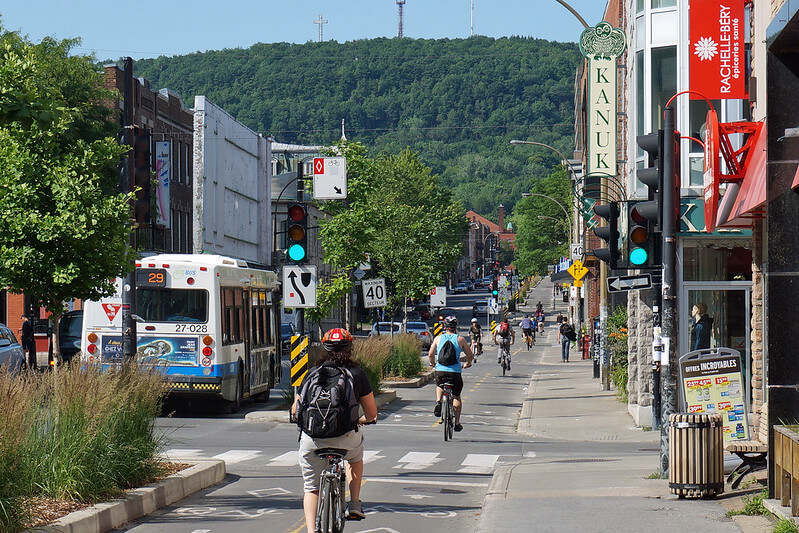Though cash-starved and hard-hit by COVID and climate change, cities are punching well above their weight for solutions
Picture:
Montreal’s new plans to cut emissions in half by 2030 includes banning non-electric vehicles from the city’s downtown core. Photo credit: Steve Boland
n the midst of discord south of the border and ongoing pandemic problems it’s important to take a moment to celebrate good news when it happens. And in mid-December, Montréal Mayor Valérie Plante delivered an early Christmas present to her city and the planet: arguably the most comprehensive plan to fight climate change of any Canadian city to date.
In a speech to the United Nations in late 2019, Plante pointed out that cities are on the front lines of climate change, having to deal regularly with negative impacts like flooding and heatwaves. “The [United Nations] Secretary-General has set a target for states to reduce their emissions by 2030 and commit to being completely carbon neutral by 2050,” said Plante. “I’m ready to go further.”
Plante has now followed through in magnificent fashion, introducing a plan that not only aims for carbon neutrality by mid-century but that cuts her city’s emissions by more than half by 2030. Montréal’s plan includes forty-six actions to help drive ambitious reductions, including banning non-electric vehicles from the city’s downtown core, removing parking around Metro stations, implementing an innovative system for disclosing building energy ratings and adopting strict energy efficiency standards for new construction. In fact, the city is already planning a zero-carbon neighbourhood on the site of the old Hippodrome horse-racing track.
There are a few unique aspects to Montréal’s approach. In keeping with the collaborative nature of Plante’s administration, the plan is being backed by a number of major civil society organizations, including the Trottier Family Foundation and the Foundation of Greater Montréal, who will lead an effort to engage major economic players and institutions in implementing the plan as a critical part of building a healthy and equitable city. It also includes a requirement for annual progress reports, something the federal government has only recently committed to in its Climate Accountability Act after years of missing targets. More importantly, the Montréal plan includes a “climate test” for all government decision-making. Requiring that all city decisions around spending or infrastructure consider climate implications “sets a standard for all public administrations,” according to Marc-André Viau of the Quebec-based environmental organization Équiterre.
Though the current “best in class,” Montréal is not unique amongst Canadian cities for tackling the climate challenge. For instance, Vancouver is looking to deter cars from travelling into its core with a congestion charging system and by putting a strong emphasis on a shift to “active” transportation like walking and cycling. It’s aiming for a city in which 90% of people live within “an easy walk or roll” of their daily needs and two-thirds of trips are by active transportation or transit by 2030.
Montréal and Vancouver will be well served by the bans enacted by their respective provincial governments on the sale of internal combustion vehicles (2035 in Quebec; 2040 in BC). This provincial action will, for example, help put Vancouver well on the road to achieving its goal of having 50% of the distance driven on the city’s roads be by zero emissions vehicles by 2030. Montréal will, in turn, lead by example by converting all city vehicles to electric by 2030 and will simultaneously encourage residents to switch to car sharing with the added goal of seeing a 25% decrease in single-occupant vehicle trips over the same time frame.
Toronto has an official goal of reducing citywide emissions by 65% by 2030 and achieving net zero by 2050 “or earlier.” Thanks in part to Ontario’s coal power phase out, Toronto’s emissions have already declined by 37% since 1990, a benefit Edmonton may also be about to reap as Alberta accelerates its own move away from coal and the city strives to reduce its emissions by 35% from current levels by 2035.
Climate change is a uniquely complex challenge and one that will require simultaneous interventions from all levels of government. Canadian cities, though chronically cash-starved and dramatically impacted by COVID and climate change alike, are punching well above their weight when it comes to solutions. Our country is well-served by this ambition.
Article Credit: corporateknights
